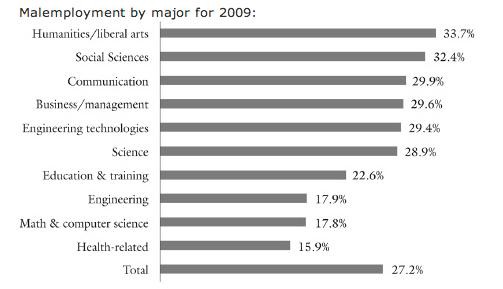When Were You Mal-employed?

Most observers agree that a college degree yields, on average, a large earnings advantage. But our findings reveal that this advantage is heavily dependent on the ability of college graduates to find employment in CLM occupations [the “college labor market” — jobs which utilize skills learned in college]. College graduates who work in semiskilled /unskilled blue collar, low-end service and sales, transportation and warehousing, and other occupations outside of the CLM experience have much lower annual earnings that may not justify the economic and personal costs of completing a college degree program.
At Econlog, Bryan Caplan provides a primer on mal-employment, which is the word economists use to describe college graduates accepting and working in jobs that don’t require a college degree (college grads working in coffee shops, for example). Not surprisingly, mal-employment occurs the highest among humanities and liberal arts majors, but it also happens across the board — I’m surprised by the mal-employment percentage among engineering technology majors, which is based on this study by Drexel University.
I spent a period of mal-employment driving a truck for a few months during the financial crisis to make some cash. You do what you have to when you have bills to pay.
Support The Billfold
The Billfold continues to exist thanks to support from our readers. Help us continue to do our work by making a monthly pledge on Patreon or a one-time-only contribution through PayPal.
Comments